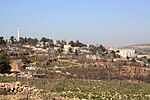2014 Gush Etzion kidnapping and murder

The 2014 Gush Etzion kidnapping and murder refers to the abduction and killing of three Israeli teenagers in the West Bank during June 2014. The victims, Eyal Yifrach, Gilad Shaer, and Naftali Fraenkel, were Israeli students aged 16 and 19. On the evening of 12 June 2014, the three teenagers were hitchhiking in the Alon Shvut settlement in Gush Etzion, in the West Bank when they were abducted. The Israel Defense Forces immediately initiated Operation Brother's Keeper (Hebrew: מבצע שובו אחים, romanized: Mivtza Shuvu Ahim) in search of the three teenagers. On 30 June, their bodies were found in a shallow grave near the town of Halhul. Israeli authorities accused two members of the Palestinian militant group Hamas, Marwan Qawasmeh and Amer Abu Aisha, of carrying out the abduction and murder. As part of the operation, Israel arrested around 350 Palestinians, including nearly all of Hamas' West Bank leaders. The suspects were killed during a standoff with Israeli security forces on 23 September 2014, leading to the end of the operation. The incident gained significant international attention and escalated tensions between Israelis and Palestinians, leading to an increase in violence and retaliatory actions and eventually triggering the 2014 Gaza War.
Excerpt from the Wikipedia article 2014 Gush Etzion kidnapping and murder (License: CC BY-SA 3.0, Authors, Images).2014 Gush Etzion kidnapping and murder
367, Beitar Ilit
Geographical coordinates (GPS) Address Nearby Places Show on map
Geographical coordinates (GPS)
| Latitude | Longitude |
|---|---|
| N 31.6547 ° | E 35.1223 ° |
Address
367
Beitar Ilit
Judea and Samaria, Palestinian Territories
Open on Google Maps








